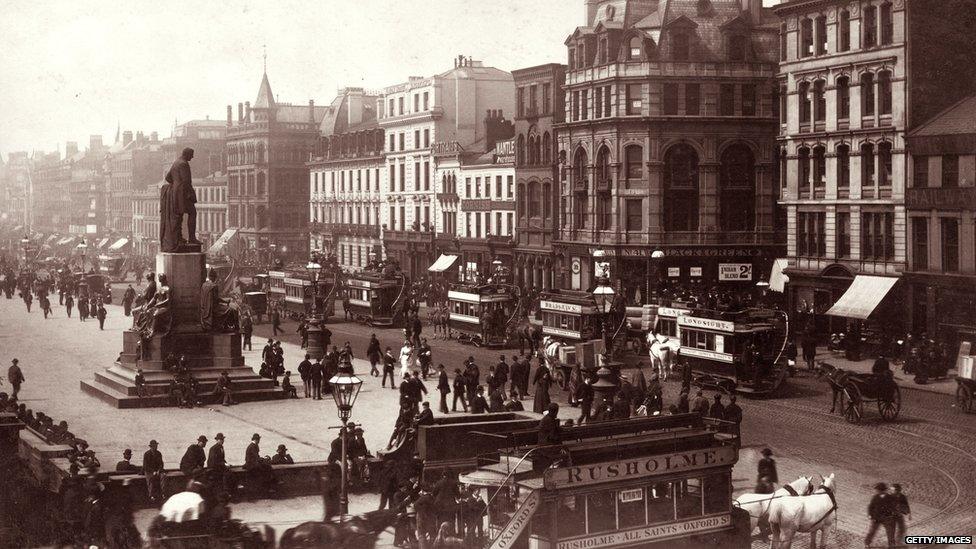A real 'devolution revolution'?
- Published
- comments

"People must have more direct power over the areas in which they live," the prime minister declared in his introduction to the Queen's Speech. His chancellor is promising a "devolution revolution" for England, with the Cities Devolution Bill being debated for the first time in Parliament next week.
But how radical is the offer? England has been described as the most centralised state in the world (with the possible exception of North Korea). David Cameron insists transferring power away from Westminster is a vital part of his "one nation" political philosophy. But critics have dismissed the potential shift of power to city regions such as Greater Manchester as no more than "a fractional step".
The proposal for English devolution does remain a very top-down process - ministers munificently bestowing a little extra local control over budgets that, in other parts of Europe, would always have been regionally or locally administered. In Germany, for instance, 19% of public expenditure is controlled by central government. In the UK it is 72%.
Today the Local Government Information Unit (LGIU), a think-tank and lobby group for councils, calls for a truly radical alternative, external. It argues for the whole devolution process to be turned on its head.
Instead of Whitehall playing the part of generous benefactor, offering minor concessions to grateful power-starved municipal leaders, local authorities and other agencies would tell government what control they want, the presumption "always in favour of devolving powers, unless there were compelling reasons not to do so".
Now, that would be a 'devolution revolution' - but government ministers are very unlikely to agree to such an idea, and not just so they can hold on to their power. Caution is understandable because, as the LGIU puts it, "politicians at the centre are reluctant to cede powers and responsibilities in a political system where blame and failure are centralised".
We know what would happen. Some super-council would prove not to be so super after all. A fiasco over city planning or transport would explode over the front pages and onto Twitter, with a government minister hauled into the Commons to explain what had gone wrong. Attempts to suggest that the failure was the fault of the combined authority would be dismissed as buck-passing and the hapless minister's head would be on a metaphorical pike before lunchtime.
"In a reversal of what Baldwin termed the harlot's prerogative, central government risks assuming responsibility without power," as the LGIU report puts it.
George Osborne's demand that cities have an elected mayor before they get real control of the cash is as much about giving voters someone else to blame when things go wrong as it is about concerns over democratic accountability.
The reluctance to offer smaller towns and counties the kind of power being suggested for metropolitan England also stems from concerns that such areas don't possess the capacity or character to deflect potential criticism from the centre.
It is, perhaps, a mark of the highly centralised politics we are accustomed to that we find it so hard to get our heads around local authorities taking full responsibility for their governance of their patch.
As the LGIU report notes: "The great municipalisation of the 19th century was driven by local government that was largely self-funding and that had the confidence and the power to drive through quantum leaps, in education, healthcare, housing, and sanitation."

Manchester 1880: Municipalisation was driven "by local government that was largely self-funding"
How many of us would look to our town hall representatives to take on that kind of responsibility today? Local government Minister Brandon Lewis recently described councillors as "volunteers undertaking public service". While formally correct, the phrase does suggest council chambers are populated by kind-hearted amateurs (in contrast to the hard-nosed professionals in Westminster).
If, somehow, public confidence in local governance could be returned to Victorian levels, then how would the LGIU's "evolution of power from the local rather than devolution of power from the centre" actually work?
The idea is that local authorities, perhaps alongside local health professionals and business people, would set out a plan for the powers they need "in order to drive growth and deliver effective public services in their localities".
"The shape of such deals will be determined by local needs and aspirations not by a blueprint approved (either explicitly or implicitly) by central government," the LGIU explains.
The plan might demand local control of Whitehall budgets but also, potentially, new tax-raising powers or changes to the borrowing rules - real political clout. There would be a series of tests to ensure the proposals stack up, but should a local bid fail to satisfy these tests, central government would provide the support to help them do so within a year.
"It allows devolution to happen at speed and at scale and decouples progress from the institutional capacity of DCLG and the Treasury to process and negotiate deals. Its emphasis is on a 'bottom-up' rather than a 'top-down' process of implementation: it will be for local leaders, politicians and communities to generate devolution proposals themselves."
It is a challenge to the prime minister and the chancellor. Just as Nicola Sturgeon is demanding more powers for Scotland, so today's report dares central government to transfer significant control to English local authorities - a true revolution in devolution.